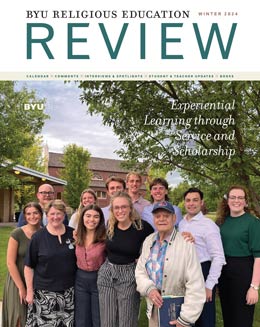Emma Taylor is an editorial intern at the BYU Religious Studies Center.
Political affiliation is one of the most divisive identifiers in not only our country but global interactions. Now more than ever, it takes a mere spark of charged conversation to ignite a fiery argument between two people of differing political perspectives that often ends with both parties being burned. Where exactly is the line between faith and politics? It can be especially difficult for members of The Church of Jesus Christ of Latter-day Saints to distinguish between the two, considering that both are so intimately entwined in our lifestyle. Turn to the history books, and one will find that the very foundation of the Restoration of the gospel is steeped in tensions between faith and politics. From the time of Joseph Smith to now, this struggle has been an appendage to the entire history of the Church. But is there only one way to serve both God and country?
As recently as June 1, 2023, the First Presidency of The Church of Jesus Christ of Latter-day Saints issued a letter titled “Political Participation, Voting, and the Political Neutrality of the Church.” In it, the First Presidency reaffirmed the political neutrality that the Church as an organization abides by and reminded members that truths of the gospel can be found in many political parties. They advise, “Some principles compatible with the gospel may be found in various political parties, and members should seek candidates who best embody those principles. Members should also study candidates carefully and vote for those who have demonstrated integrity, compassion, and service to others, regardless of party affiliation. Merely voting a straight ticket or voting based on ‘tradition’ without careful study of candidates and their positions on important issues is a threat to democracy and inconsistent with revealed standards.”[1]
The letter shakes off the assumption that members of the Church are encouraged to vote for one party. Although the Church in the United States has long been predominantly conservative, the First Presidency makes it clear that straight-ticket voting based on tradition alone abbreviates the agency that is at the center of our doctrine. This powerful statement is timely and needed, as the 2024 United States presidential election is just around the corner. Now is the time to educate ourselves to make informed political decisions that best reflect principles of the gospel.
It is with great timeliness, then, that Richard Davis introduces his latest volume. Faith and Politics: Latter-day Saint Politicians Tell Their Stories is published by the BYU Religious Studies Center and Deseret Book. This book features interviews with twenty-five Latter-day Saint politicians from all over the world with different political parties and perspectives. While these politicians have varying political beliefs, their work is rooted in their faith in Jesus Christ. It’s a good reminder that there is not just one way to be a member of the Church and that political affiliation is not a determinant of testimony.
The book’s interview format allows for these politicians to tell their stories on their own terms. It’s an engaging glimpse into how life experiences and faith interact to influence political practices. No matter where one is on the political spectrum, there is so much to be learned from these men and women. Interviewees were asked to explain their background, talk about the offices that they have run for and served in, and lessons learned they’ve learned about politics that they want to share with youth. Yéah Samaké speaks on his experience growing up Muslim in Mali, West Africa, describing his conversion to The Church of Jesus Christ of Latter-day Saints and lessons on service he learned from his father and his faith that became the focus of his mayorship. Harry Reid discusses the extreme poverty of where he grew up in the small town in Nevada, how he came to find the Church, and the criticism he has faced over the years from other Latter-day Saints about his political positions. Aimee Winder Newton shares how faith shapes her approach to politics and the challenges she has faced as a woman running for governor in Utah. These remarkable individuals, though diverse in background and politics, are united in their faith in Christ, which is at the center of their service to their communities.
In a system where individuals are categorized into warring ideologies with no room for nuanced understanding, Faith and Politics is a refreshing look at the humanity found beneath labels of political affiliation. If we take the time to truly understand the lives and perspectives of others, conflict will dissipate and be replaced with compassion. Faith and Politics is an exceptionally valuable resource that takes the time to understand the beauty in diverse perspectives.
Notes
[1] First Presidency letter, “Political Participation, Voting, and the Political Neutrality of the Church,” June 1, 2023, https://
